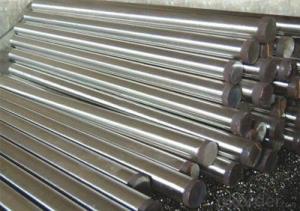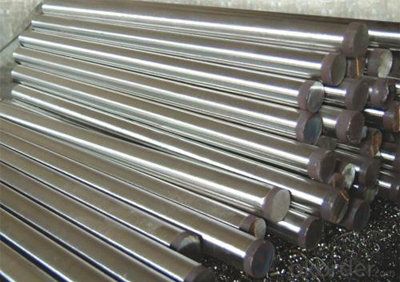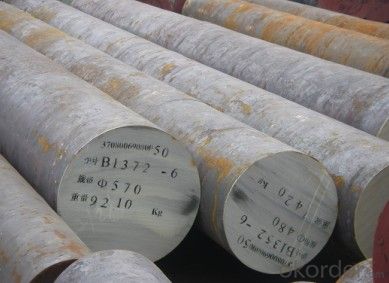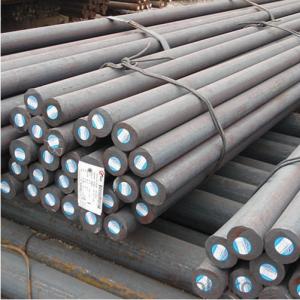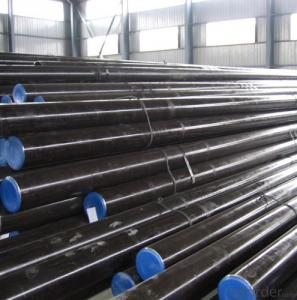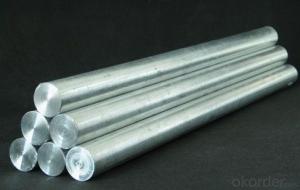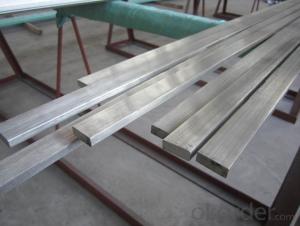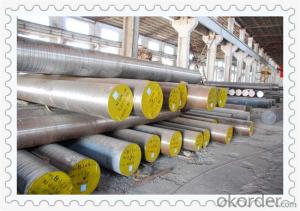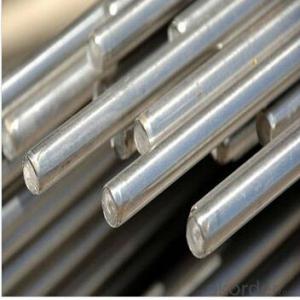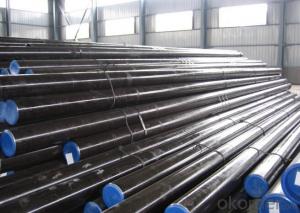Spring Steel Alloy Steel Round Bar High Quality
- Loading Port:
- China Main Port
- Payment Terms:
- TT or LC
- Min Order Qty:
- -
- Supply Capability:
- -
OKorder Service Pledge
OKorder Financial Service
You Might Also Like
Product Description:
OKorder is offering Spring steel at great prices with worldwide shipping. Our supplier is a world-class manufacturer of steel, with our products utilized the world over. OKorder annually supplies products to European, North American and Asian markets. We provide quotations within 24 hours of receiving an inquiry and guarantee competitive prices.
Product Applications:
-ASTM1065, is medium-high carbon spring steel. After heat treatment, this type of steel obtains high strength, hardness and elasticity but this material isn’t perfect for welding.
-Its fatigue strength is equal to alloy spring steel when they are in same configuration.
-For manufacturing spring, spring circle, all kinds of grommet, clutch, and axels in the production of normal machine.
Product Advantages:
OKorder's spring steel are durable, strong, and resist corrosion.
Main Product Features:
· Premium quality
· Prompt delivery & seaworthy packing (30 days after receiving deposit)
· Corrosion resistance
· Can be recycled and reused
· Mill test certification
· Professional Service
· Competitive pricing
Product Specifications:
USA, ASTM | CHN, GB/T | JPN, JIS | ISO |
1065 | 65 | SWRH67A SWRH67B | Type SC Type DC |
FRA, NF | GBR, BS | ||
C66D | C66D |
Chemical Composition:
C | Mn | Ni | Si |
0.62~0.70 | 0.50~0.80 | ≤0.30 | 0.17~0.37 |
P | S | Cr | Cu |
≤0.035 | ≤0.035 | ≤0.25 | ≤0.25 |
Mechanical Properties:
-Tensile Strength σb (MPa): ≥695
-Yield Strength σs (MPa): ≥410
-Elongation δ10(%): ≥10
-Percentage reduction of area: ψ (%): ≥30
-Hardness HBS, no heat treatment: ≤255
Transportation:
1, The products can be delivered by bulk vessel or by container. As for container, products with the length of 6m will be loaded in 20’ container, with 9m or 12m, in 40’ container.
2, The maximum quantity of loading of container is 25 tons.
3, The products are usually transported to the nearest port from the production place.
FAQ:
Q1: Why buy Materials & Equipment from OKorder.com?
A1: All products offered byOKorder.com are carefully selected from China's most reliable manufacturing enterprises. Through its ISO certifications, OKorder.com adheres to the highest standards and a commitment to supply chain safety and customer satisfaction.
Q2: How do we guarantee the quality of our products?
A2: We have established an advanced quality management system which conducts strict quality tests at every step, from raw materials to the final product. At the same time, we provide extensive follow-up service assurances as required.
Q3: How soon can we receive the product after purchase?
A3: Within three days of placing an order, we will begin production. The specific shipping date is dependent upon international and government factors, but is typically 7 to 10 workdays.
Images:
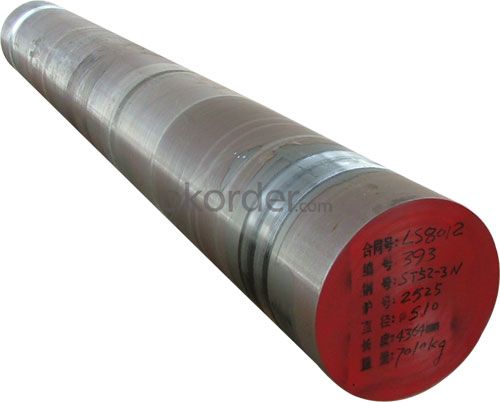
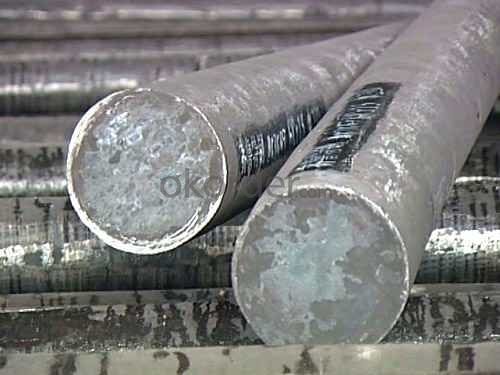
- Q: Can special steel be used in the manufacturing of household appliances?
- Yes, special steel can be used in the manufacturing of household appliances. Special steel, also known as alloy steel, offers a range of desirable properties such as high strength, durability, and resistance to corrosion and wear. These characteristics make it suitable for various applications, including the production of household appliances. Household appliances such as refrigerators, ovens, dishwashers, and washing machines require materials that can withstand constant use, high temperatures, and exposure to water and chemicals. Special steel fulfills these requirements and provides a reliable and long-lasting solution. For example, stainless steel is a type of special steel commonly used in household appliances due to its corrosion resistance and hygienic properties. It is used in appliance components such as refrigerator doors, oven interiors, and dishwasher interiors. Stainless steel is easy to clean, maintains its appearance over time, and does not react with food or other substances, making it an ideal choice for household appliances. Additionally, special steel alloys can be used to enhance specific properties needed in different appliances. For instance, heat-resistant alloys can be utilized in ovens or stovetops, while high-strength steel alloys can be employed in appliances that require structural integrity, like washing machines or dryers. In summary, special steel can definitely be used in the manufacturing of household appliances. Its various properties, including strength, durability, resistance to corrosion, and versatility, make it an excellent material choice for ensuring the performance, longevity, and safety of household appliances.
- Q: How does special steel perform in abrasive environments?
- Special steel performs exceptionally well in abrasive environments. Its high hardness and resistance to wear make it ideal for applications where there is constant contact with abrasive materials. Special steel can withstand the impact and friction caused by abrasive particles, ensuring longevity and durability in such environments. Additionally, its corrosion resistance properties prevent the steel from deteriorating due to exposure to moisture or chemicals commonly found in abrasive environments. Overall, special steel is specifically designed to excel in abrasive conditions, providing optimal performance and reliability.
- Q: What are the main factors affecting the creep resistance of special steel?
- The main factors affecting the creep resistance of special steel are the alloy composition, the microstructure, and the processing conditions. The specific combination of alloying elements and their concentrations significantly influence the material's ability to resist deformation under elevated temperatures and constant stress. Additionally, the microstructure, including grain size and distribution, plays a crucial role in determining the material's creep resistance. The processing conditions, such as heat treatment and thermal cycling, can further affect the creep performance by altering the material's microstructure and mechanical properties.
- Q: How is case-hardening steel used in the manufacturing of gears?
- Case-hardening steel is used in the manufacturing of gears to increase their hardness and durability. This process involves adding a thin layer of hard and wear-resistant material on the surface of the gear, while maintaining a tougher and more flexible core. The case-hardened gears can withstand higher loads, resist wear and fatigue, and have a longer lifespan, making them ideal for demanding industrial applications.
- Q: What are the main characteristics of pressure vessel steel?
- Pressure vessel steel is a specialized type of steel that is manufactured and designed to endure high-pressure environments. It possesses distinct properties that enable it to be suitable for such applications. To begin with, pressure vessel steel demonstrates exceptional strength and toughness. It can withstand the internal pressure exerted upon it without deforming or rupturing, thereby ensuring the security and integrity of the vessel. Achieving this high strength involves carefully alloying and heat treatment processes that enhance its mechanical properties. In addition, pressure vessel steel displays favorable weldability. This is crucial as pressure vessels often require the joining of various components. The capacity to weld the steel without compromising its structural integrity is imperative for fabricating and maintaining pressure vessels. Moreover, pressure vessel steel is renowned for its elevated corrosion resistance. Typically, the steel is alloyed with elements like chromium, molybdenum, and nickel, which provide a protective barrier against corrosive substances and environments. This plays a vital role in preventing the deterioration of the vessel and ensuring its long-term durability. Furthermore, pressure vessel steel possesses the ability to withstand a wide range of temperatures. It can maintain its strength and toughness even under extreme temperature conditions, rendering it suitable for applications where the vessel is exposed to high or low temperatures. Lastly, pressure vessel steel is subjected to stringent testing and quality control measures to guarantee its reliability and safety. It must meet specific standards and certifications, such as those established by organizations like the American Society of Mechanical Engineers (ASME), to be deemed suitable for pressure vessel applications. Overall, the primary characteristics of pressure vessel steel include high strength and toughness, favorable weldability, corrosion resistance, temperature resistance, and adherence to strict quality standards. These properties make it an ideal material for constructing pressure vessels, which find application in various industries such as oil and gas, chemical processing, and power generation.
- Q: What are the common challenges in welding special steel?
- Welding special steel can present several challenges that differ from welding regular carbon steel. Some common challenges in welding special steel include: 1. High carbon content: Special steels often have a high carbon content, which can lead to increased hardness and brittleness. This can make it more difficult to achieve a proper weld without experiencing cracking or other defects. 2. High alloy content: Special steels often contain various alloying elements, such as chromium, nickel, or molybdenum, which can impact the weldability. These elements can introduce complexities, such as increased susceptibility to heat-affected zone (HAZ) cracking or the formation of brittle phases. 3. Heat sensitivity: Special steels are often more sensitive to heat input during welding. Excessive heat input can result in grain growth, reduced mechanical properties, or distortion of the welded structure. Therefore, careful control of heat input and preheating techniques may be necessary. 4. Pre-weld and post-weld treatments: Special steels may require specific pre-weld and post-weld treatments to ensure proper weld quality and performance. These treatments can include preheating, stress relieving, or post-weld heat treatment. Failure to follow these procedures can lead to the development of residual stresses or reduced mechanical properties. 5. Joint design and fit-up: The design and fit-up of the weld joint can also pose challenges. Special steels may require specific joint configurations, such as a double-V or double-U groove, to ensure proper penetration and fusion. Additionally, tight tolerances may be necessary to maintain the desired mechanical properties of the welded structure. 6. Welding process selection: The choice of welding process can greatly impact the success of welding special steel. Some processes, such as TIG or laser welding, may be more suitable for welding high-alloy steels, while others like MIG or submerged arc welding may be better suited for specific applications. Selecting the appropriate welding process is crucial to achieving a sound weld with the desired properties. To overcome these challenges, it is essential to have a thorough understanding of the specific type of special steel being welded and to follow proper welding procedures and techniques. This may involve conducting pre-weld qualification tests, employing suitable welding consumables, and ensuring proper heat control throughout the welding process. Additionally, working with experienced welders and seeking guidance from experts in special steel welding can help overcome these challenges effectively.
- Q: What are the requirements for special steel used in ballistic protection?
- The requirements for special steel used in ballistic protection include high strength and hardness, excellent toughness, good weldability, and resistance to deformation and cracking under high impact loads. It should also possess low weight, good formability, and corrosion resistance to ensure long-term durability and performance. Additionally, the steel must meet specific ballistic standards such as withstanding penetration from high-velocity projectiles and providing effective protection against ballistic threats.
- Q: Can special steel be used in the beverage manufacturing industry?
- Yes, special steel can be used in the beverage manufacturing industry. Special steel, such as stainless steel, is commonly used in beverage processing equipment due to its corrosion resistance, hygienic properties, and durability. It is particularly suitable for manufacturing tanks, pipes, valves, and other components that come into contact with beverages, ensuring a high level of safety and maintaining the quality of the products.
- Q: Can special steel be used in food processing?
- Yes, special steel can be used in food processing. Special steels, such as stainless steel, are commonly used in the food processing industry due to their unique properties that make them suitable for handling food safely. Stainless steel is resistant to corrosion, which makes it ideal for handling acidic or salty foods without the risk of contamination. It is also non-reactive, meaning it does not release any harmful substances into the food during processing. Additionally, stainless steel is easy to clean and maintain, ensuring high hygiene standards in food processing facilities. With these qualities, special steels like stainless steel are widely used in the production of food processing equipment, such as tanks, pipes, and utensils.
- Q: How does special steel contribute to the shipbuilding industry?
- Special steel contributes to the shipbuilding industry in several ways. Firstly, special steel offers enhanced strength and durability, making it an ideal material for constructing various components of ships. This includes the hull, decks, bulkheads, and other structural elements that need to withstand the harsh marine environment and heavy loads. Special steel also provides excellent resistance to corrosion and abrasion, which is crucial for ships that are constantly exposed to saltwater and other corrosive agents. This ensures that the ship remains in good condition for a longer lifespan, reducing maintenance costs and increasing operational efficiency. Moreover, special steel offers superior weldability and formability, allowing shipbuilders to create complex shapes and structures with ease. This flexibility in design enables the construction of innovative and efficient ship designs, such as large container vessels, offshore oil rigs, and naval warships. In addition, special steel is often used for manufacturing critical components like propeller shafts, rudders, and engine parts. These components require high strength, toughness, and resistance to fatigue, as they are subjected to extreme forces and vibrations during operation. Special steel's unique properties ensure the reliability and performance of these crucial ship parts. Furthermore, special steel contributes to the shipbuilding industry by enabling the construction of lightweight ships without compromising strength and safety. This helps reduce fuel consumption, leading to improved energy efficiency and lower greenhouse gas emissions. As environmental regulations become increasingly stringent, special steel plays a vital role in making ships more sustainable and eco-friendly. Overall, special steel is an essential material in the shipbuilding industry due to its exceptional strength, durability, corrosion resistance, weldability, formability, and lightweight properties. Its use not only ensures the safety and longevity of ships but also facilitates the development of advanced ship designs and contributes to the industry's overall sustainability.
Send your message to us
Spring Steel Alloy Steel Round Bar High Quality
- Loading Port:
- China Main Port
- Payment Terms:
- TT or LC
- Min Order Qty:
- -
- Supply Capability:
- -
OKorder Service Pledge
OKorder Financial Service
Similar products
Hot products
Hot Searches
Related keywords
